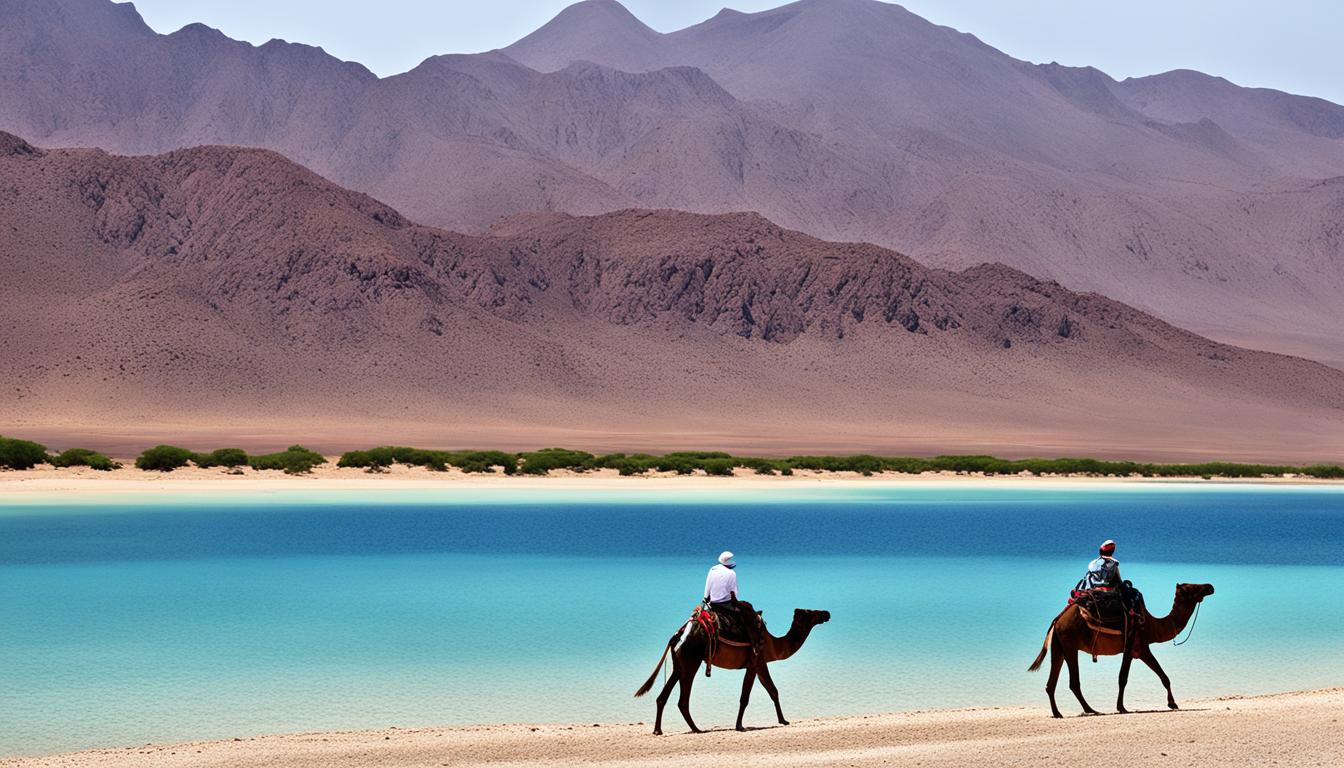Djibouti, a small country in the Horn of Africa, is a hidden treasure. It mixes cultures, landscapes, and unforgettable experiences. You can float in the salty waters of Lake Assal or swim with whale sharks in the Bay of Ghoubet. Djibouti has many top attractions for travelers.
This article will show you the best things to do in Djibouti. You’ll see stunning natural sights, ancient history, and a lively food scene.
So, why should you visit Djibouti? It’s an adventure for those who love to explore. Let’s discover the hidden spots of this African gem together.
Key Takeaways
- Djibouti offers a unique blend of cultures, landscapes, and unforgettable experiences.
- The country is home to stunning natural wonders, including the hypersaline waters of Lake Assal and the Bay of Ghoubet, a top whale shark spotting site.
- Djibouti boasts a rich history, with ancient rock art sites dating back thousands of years.
- The diverse cuisine features a blend of influences, from spicy lamb stews to French-inspired seafood delicacies.
- Djibouti is a hidden gem that deserves a spot on any adventurous traveler’s bucket list.
Unveiling the Hidden Gem of the Horn of Africa
Djibouti, a small nation in the Horn of Africa, is a hidden gem. It offers a mix of Djibouti culture and Djibouti landscapes that will amaze you. You’ll see vibrant French colonial architecture in the capital and meet the Afar people, who have lived here for centuries.
Djibouti's Unique Blend of Cultures and Landscapes
Djibouti’s land is diverse, from the salt-covered Lake Assal to high black mountains and volcanic craters. It’s a place that feels like another world. Adventurous travelers will find it a perfect spot for an authentic experience in East Africa.
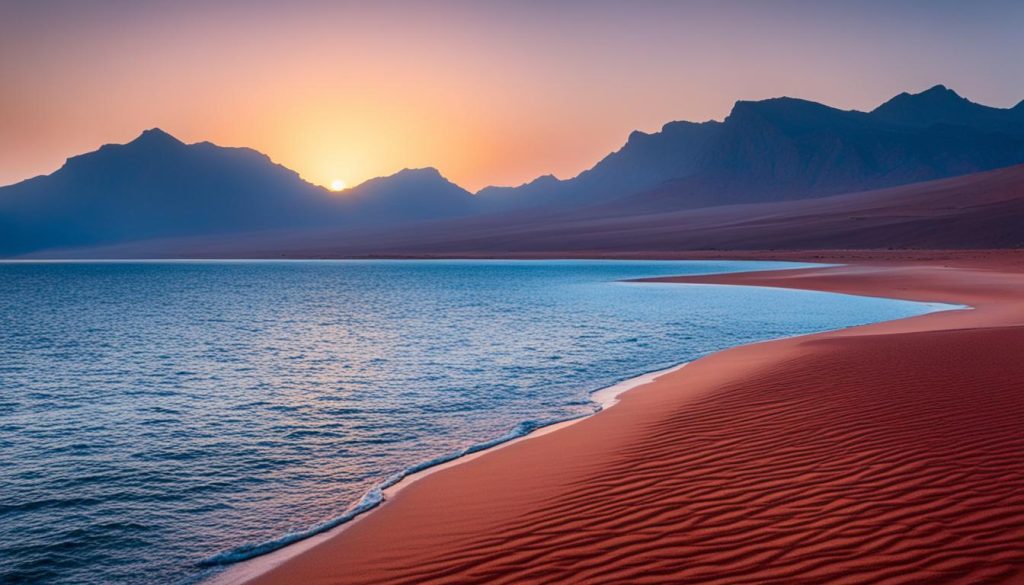
Why Djibouti Should Be on Your Travel Bucket List
Djibouti combines Djibouti culture and Djibouti landscapes in a way that’s hard to find elsewhere. It’s a place with stunning natural sights and a rich cultural scene. If you’re looking for something different, Djibouti is the place to go.
“Djibouti is a country that defies expectations, offering a unique blend of African, Arab, and European influences that have shaped its culture and landscapes.”
Looking for adventure, cultural experiences, or a beautiful escape? Djibouti has it all. It’s a place that will inspire and amaze you. So, why not put Djibouti on your travel list and discover its wonders?
Float in the Hypersaline Waters of Lake Assal
Just two hours outside Djibouti’s capital, Lake Assal is a must-see natural wonder. It’s the lowest point in Africa. Here, the hypersaline waters are so dense, you can float like a cork. You’ll see the beauty of salt crystals, lava fields, and black mountains all around you.
Experiencing the Lowest Point of Africa
Lake Assal has a salt level like the Dead Sea. It’s one of the world’s saltiest bodies of water. At an elevation of 155 meters below sea level, it feels like another world. The colors and formations are truly otherworldly.
A Surreal Landscape of Salt Crystals and Volcanic Craters
The area around Lake Assal is stunning, with Djibouti salt crystals and volcanic craters. It’s a place where you can really connect with nature. The calm and beauty of this place are unforgettable.
“Visiting Lake Assal is a unique and serene experience, allowing travelers to commune with the raw power and beauty of Djibouti’s natural wonders.”
Djibouti: Best Things to Do - Top Picks
Djibouti, a small nation in the Horn of Africa, is a hidden treasure for adventurous travelers. It offers unique experiences like floating in the hypersaline waters of Lake Assal and swimming with whale sharks in the Bay of Ghoubet. This country is perfect for those looking for extraordinary adventures.
Djibouti may be small but it’s packed with natural wonders. It’s slightly larger than Slovenia or slightly smaller than New Jersey. Yet, it’s home to 850,000 people, with most living in the capital, Djibouti City.
Don’t miss Lake Assal, the second-lowest land depression on Earth, 155 meters below sea level. Its hypersaline waters and stunning salt crystals create a surreal landscape. The Bay of Ghoubet is another must-see, where you can swim with whale sharks that come to the Red Sea seasonally.
Djibouti’s culture is also fascinating. The city of Djibouti mixes European and African styles, showing off unique architecture and lively markets. Visitors can also see ancient rock art at Abourma, which highlights Djibouti’s prehistoric past.
Whether you want adventure, beauty, or culture, Djibouti has it all. Make sure to include this hidden gem in your travel plans. Discover the wonders that make it a remarkable destination.
| Top Attractions in Djibouti | Key Facts |
|---|---|
| Lake Assal | – The second-lowest land depression on Earth, 155 meters below sea level – Considered the saltiest lake outside Antarctica – Attracts around 50,000 tourists per year |
| Bay of Ghoubet | – Preferred location for whale shark migration between November and February – Rich in marine life and a popular destination for diving and snorkeling |
| Abourma Rock Art | – Unveils Djibouti’s 7,000-year-old prehistoric heritage – Significant site for understanding the region’s ancient cultural traditions |
| Djibouti City | – The capital and largest city, known for its blend of European and African architecture – Attracts over 200,000 visitors annually, making it a top sightseeing spot |
| Day Forest National Park | – Situated 20 kilometers from the coast, featuring a dense forest and diverse wildlife – Home to approximately 175 bird species, making it a prime birdwatching spot |
Exploring Djibouti will give you a unique and unforgettable experience. From its stunning landscapes to its rich culture, this hidden gem in the Horn of Africa will leave a lasting impression.
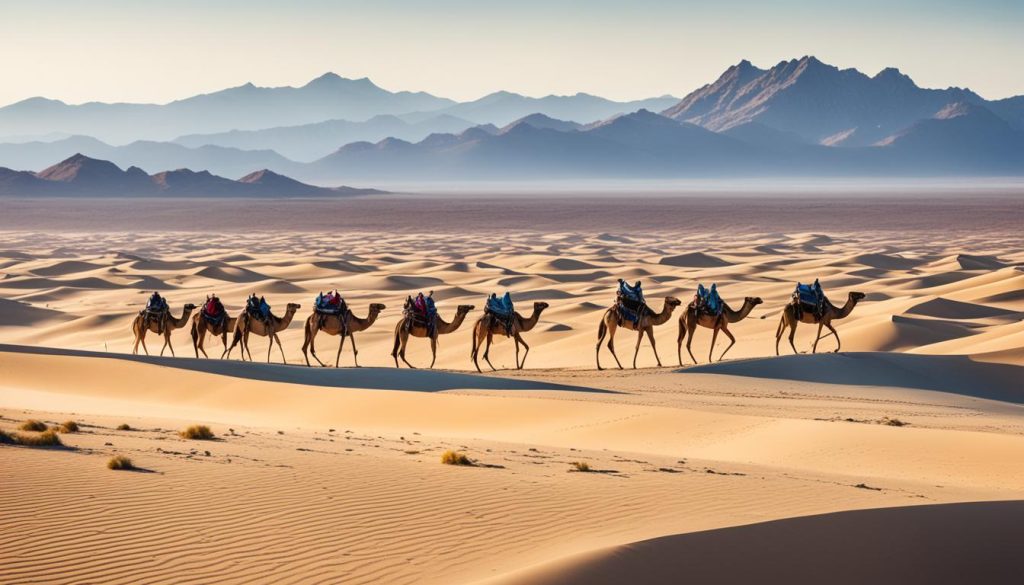
Swim with Majestic Whale Sharks in the Bay of Ghoubet
Djibouti is a key spot for whale sharks, one of the world’s most amazing sea creatures. From October to January, these huge fish come together in the Bay of Ghoubet. Here, you can swim with them.
Dolphin Excursions offers tours to see these whale sharks up close. They take you by boat to the best spots. You’ll have a great chance to snorkel and see these animals in the wild.
This experience is unforgettable. You’ll feel amazed swimming with these huge fish. They can be as long as 12 meters.
“Djibouti is one of the few places in the world where juvenile whale sharks are known to hang out. The waters of Ghoubbet al Kharab in Djibouti are especially rich in plankton, making it an ideal nursery ground for baby whale sharks.”
The Bay of Ghoubet is a special place for whale shark sightings. It’s a chance to see these amazing creatures in their home. Don’t miss out on swimming with Djibouti’s whale sharks.
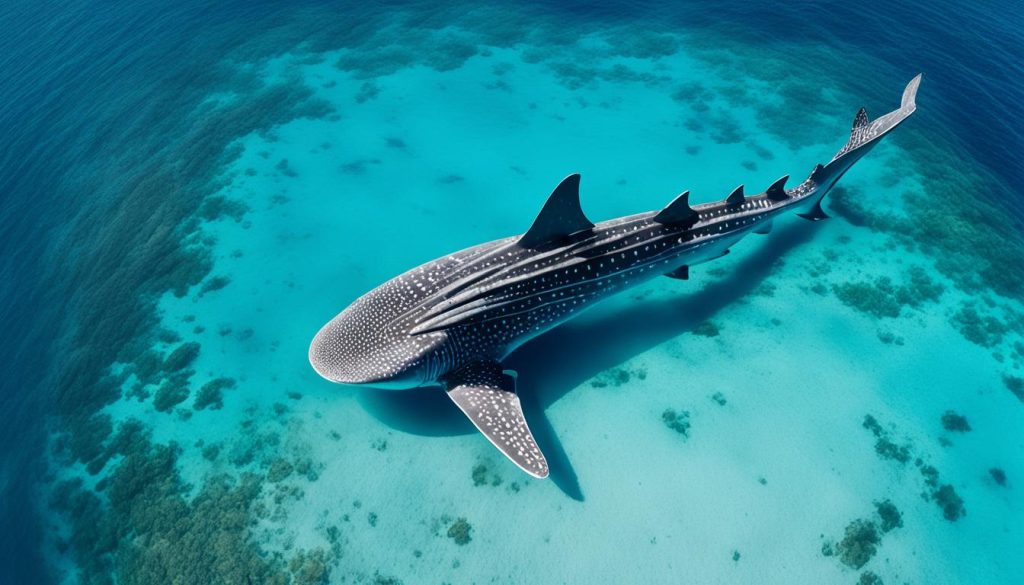
- Book your tour with a reputable and experienced operator like Dolphin Excursions.
- Bring your own snorkel gear or rent it on-site for the best experience.
- Be respectful of the whale sharks and follow the guidance of your tour guide.
- Dress appropriately in lightweight, quick-drying clothing.
- Protect your skin with reef-safe sunscreen to minimize your impact on the marine ecosystem.
Ghoubet Bay in Djibouti is perfect for those who love wildlife and nature. Don’t miss the chance to swim with Djibouti’s whale sharks. It’s an experience you’ll always remember.
Discover 7,000 Years of Rock Art at Abourma
Djibouti’s history goes way back, not just to its colonial days. It has a stunning collection of prehistoric rock art over 7,000 years old. The Abourma Rock Art Site, 14 miles from Randa, shows off vibrant paintings of giraffes, antelopes, and ostriches. These paintings give us a peek into the lives of the ancient people who lived here.
Unveiling Djibouti's Prehistoric Heritage
To get to this site, you need a four-wheel-drive vehicle and a guide. But seeing the Abourma Rock Art and Djibouti prehistory is totally worth it. At the Abourma Rock Art Site, visitors can feel connected to Djibouti’s deep cultural roots. They can learn about the people who lived here for thousands of years.
The rock art at Abourma shows the creativity and skill of Djibouti’s ancient people. These paintings of wildlife and everyday life are a window into the past. They highlight the artistic talent and cultural traditions of the early inhabitants. By visiting, travelers can dive into Djibouti’s history and appreciate the human spirit that shaped this land.
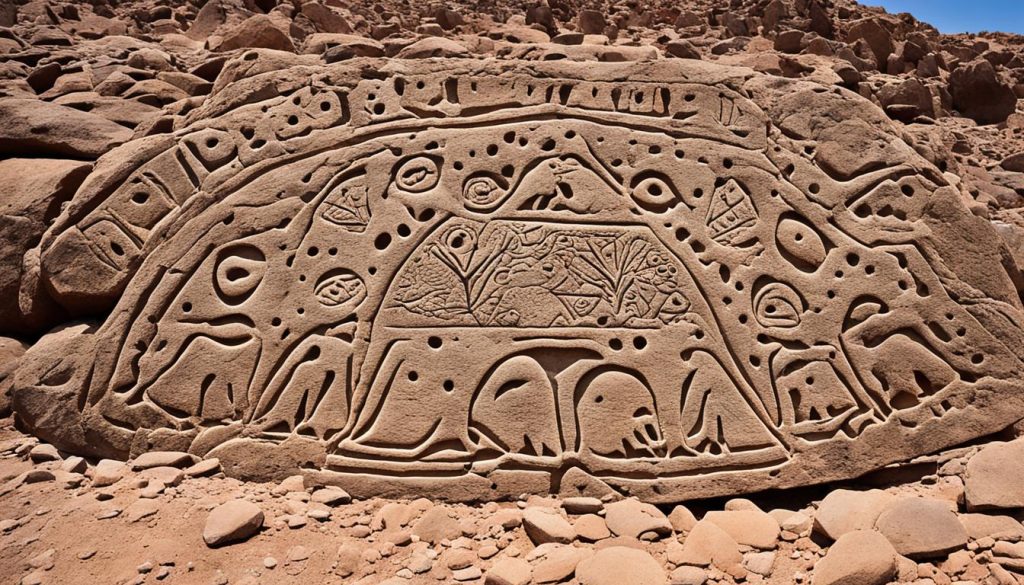
“The Abourma Rock Art Site is a mesmerizing glimpse into Djibouti’s past, a testament to the enduring human spirit that has shaped this land for millennia.”
Visiting the Abourma Rock Art Site is a special experience. It lets visitors step back in time and connect with Djibouti’s rich history. It’s perfect for history lovers, art fans, or anyone wanting to explore Djibouti’s cultural heritage. A trip to Abourma is a must for anyone traveling to Djibouti.
Relax on the Pristine Shores of Les Sables Blanc
Visiting Djibouti isn’t complete without seeing its stunning beaches along the Djibouti Red Sea coast. Les Sables Blanc, or the “White Sands,” is a paradise with white sand and turquoise waters full of colorful marine life. You can relax on the beach, enjoy fresh seafood, or explore the sea by snorkeling or kayaking.
The shores of Les Sables Blanc are peaceful and beautiful, with Yemen’s shores in the distance. It’s perfect for a day of rest or adventure. The Djibouti beaches let you enjoy the country’s natural beauty.
A Red Sea Paradise with White Sands and Turquoise Waters
Les Sables Blanc is a stunning spot along the Djibouti Red Sea coast. It has white sand and clear turquoise waters, making it a serene and beautiful place. Visitors will find it unforgettable.
Les Sables Blanc is known for its vibrant marine life. Snorkelers and divers can see coral reefs, tropical fish, and maybe even whale sharks. For a calm day, you can sunbathe, swim, or eat fresh seafood at nearby restaurants.
The beauty of Les Sables Blanc is enhanced by the view of Yemen’s shores in the distance. This adds a special touch to the place, showing its cultural and geographical diversity.
Les Sables Blanc is perfect for relaxing, exploring the sea, or enjoying the sun and views. Its beautiful beaches and waters will impress you and make it a highlight of the Djibouti Red Sea coast.
Savor the Flavors of Djibouti's Diverse Cuisine
Djibouti’s food scene is a mix of African, Arab, and French tastes. It offers a unique and tasty experience. You’ll find spicy stews and delicate seafood dishes that show off the country’s rich culture.
From Spicy Stews to French-Inspired Seafood Delicacies
The Skudahkharis is Djibouti’s main dish, a lamb stew with cardamom and spices. It shows the country’s African and Arab roots. For street food, try sambussas, like Indian samosas, or enjoy sweet banana fritters.
For a fancy meal, Djibouti has French-inspired seafood dishes. At La Mer Rouge, enjoy the freshest seafood with a French twist. Don’t miss mukbaza, a fish dish with honey, banana, and dates, for a unique taste.
Djibouti’s food ranges from spicy to sweet, offering a great way to experience its culture. Whether you like traditional stews or French seafood, you’ll love the flavors of Djibouti.
“Djibouti’s cuisine is a true reflection of the country’s diverse cultural heritage, blending African, Arab, and French influences to create a uniquely flavorful and satisfying dining experience.”
Explore the Unique Francophile City of Djibouti
Djibouti City is a special place with a mix of European and African vibes. It was ruled by France in the 19th century, leaving behind a French touch. Now, you can find baguettes and croissants everywhere, along with French-style buildings.
But there’s more to the city than just French influences. It’s alive with African culture too. The markets are bustling, the music and dance are vibrant, and the food is diverse. Walking around, you’ll feel the mix of European and African cultures, making it a unique adventure.
A Blend of European and African Architecture and Culture
The city’s buildings show off its mixed heritage. You’ll see beautiful French colonial buildings next to colorful African ones. This mix makes the city’s look both striking and interesting.
The culture here is also a mix. French is spoken by 50.0% of the people, thanks to the past colonial rule. But the city also celebrates its African roots with festivals, music, and art. This gives visitors a deep cultural experience.
Visiting Djibouti City means exploring markets, trying French-inspired seafood, and seeing its unique buildings. It’s a place where European and African cultures come together in a special way.
Conclusion
Djibouti is a unique destination in the Horn of Africa that offers travelers an unforgettable experience. It has otherworldly landscapes like Lake Assal and the Bay of Ghoubet. The city is also known for its vibrant culture.
This hidden gem has a lot to offer, from adventure to relaxation and cultural heritage. We hope this article has made you want to visit Djibouti. It’s a place that will leave a lasting impression on you.
When you go, make sure to dive into the local culture and try the diverse food. Don’t miss out on the stunning natural beauty. Djibouti is a mix of history, modernity, and nature. It’s a place that will give you memories to last a lifetime.
